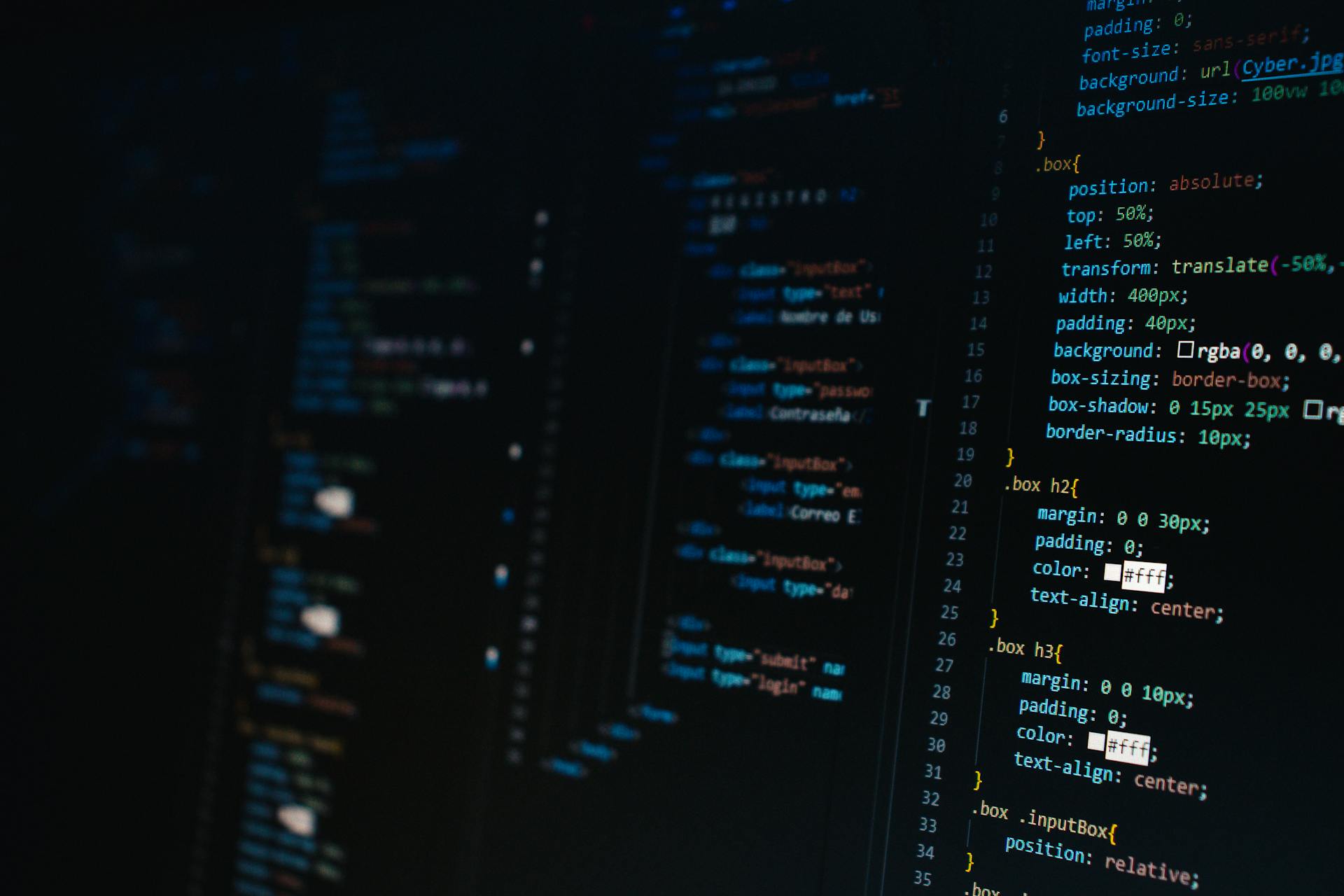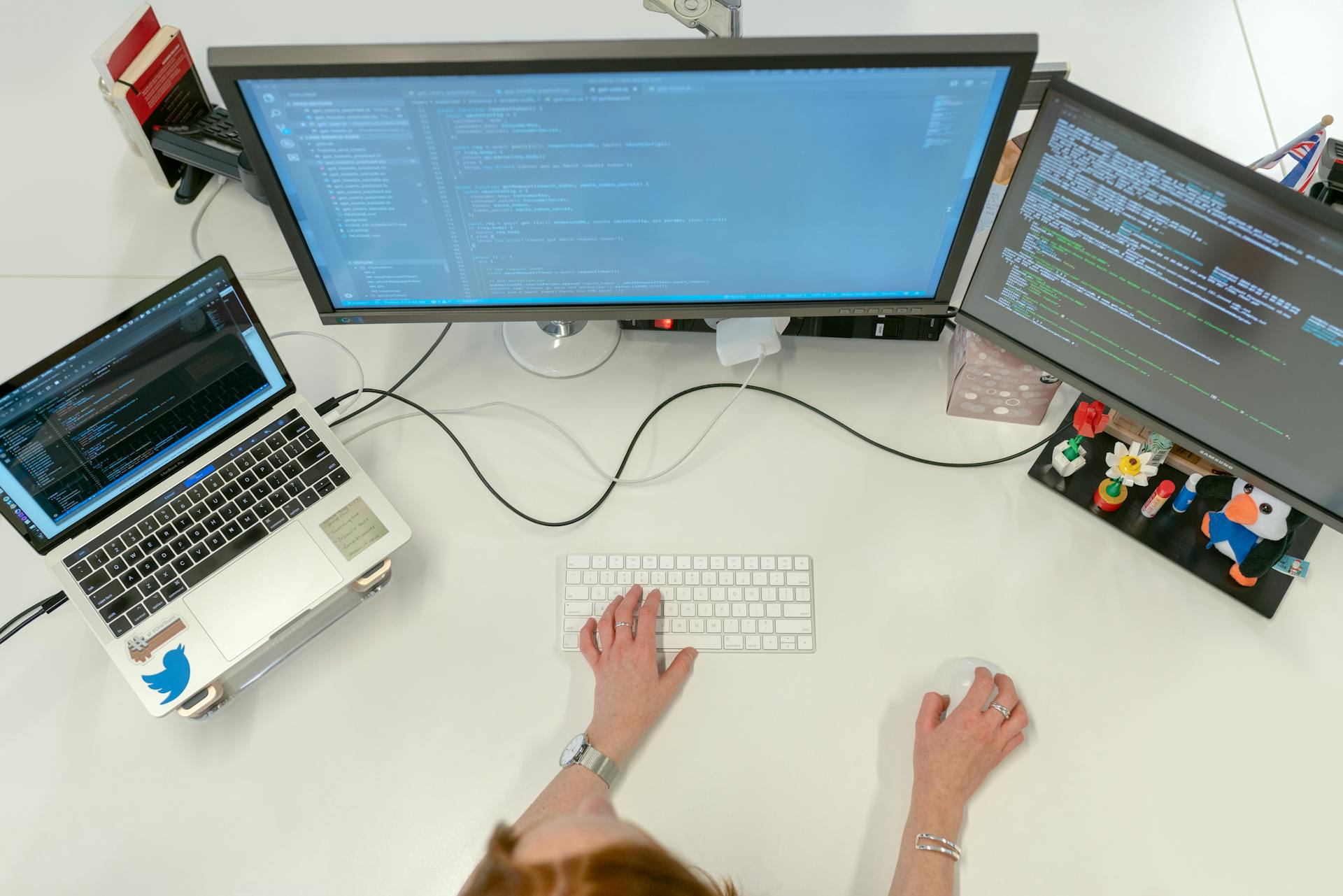
Learning to code can seem daunting, but it doesn't have to be. Python is an excellent choice for beginners, especially those new to programming. Its syntax is simple and easy to read.
Python is a versatile language that can be used for web development, data analysis, and more. As we'll see in the next section, its simplicity makes it a great language for beginners to learn.
One of the main reasons Python stands out is its large and active community. This means there are plenty of resources available to help you learn and stay up-to-date with the latest developments.
See what others are reading: What Is the Hardest Code Language to Learn
Choosing a Language
Choosing a Language is a crucial step in learning to code. It can be overwhelming with so many programming languages out there, but it doesn't have to be!
As a beginner, it's essential to consider your long-term goals and choose a language that aligns with them. For example, if you want to become a full-stack developer, learning back-end languages like Ruby on Rails, SQL, or Python is a good starting point. On the other hand, if you're interested in designing apps, front-end programming languages like HTML and CSS are the way to go.
If you're an absolute beginner, Python and JavaScript are great languages to start with. They're popular, simple, and versatile, making them perfect for total newbies. Python, in particular, is highly recommended due to its simple syntax and huge community support, which makes it easier to learn and build projects quickly.
Here are some popular beginner-friendly languages to consider:
- Python
- JavaScript
- HTML
- CSS
Remember, the key is to choose a language that you enjoy learning and that aligns with your goals. With the right language, you'll be well on your way to becoming a proficient coder!
Html
HTML is the foundation of the internet, used to set the content of web pages. It's the crucial bottom building block language for websites, and everything written inside HTML is housed in between tags.
HTML is used to format text, images, links, and more, creating the basic structure for web pages. Regular updates to HTML mean you may need to do some research to understand new tags, elements, and updates.
Explore further: Learn to Code Html and Css Develop and Style Websites
You can become expert-level with HTML in just a few months, making it an ideal place to start when learning about coding languages. Many online resources will help you learn HTML, but having a faculty member dedicated to helping you understand it can be a big advantage.
HTML is a web-based language that tells a web browser how to best display text and images on a webpage. It uses a tag system to determine back-end placement and media type.
HTML isn't technically a programming language, but it's everywhere online, so if you want to understand the internet, you'll first need to understand HTML. This makes it the easiest language to sample, especially for beginners eager to step into web development.
Here are some benefits of learning HTML:
- Understand the structure and styling of web pages
- Quickly build basic websites as you progress to other languages like JavaScript
- Gain a solid foundation before diving into full stack development
Degree Program
A degree in computer science or programming is a great way to build strong programming skills. You'll study multiple programming languages and other tech skills in a college program focused on programming.
Studying multiple programming languages is a key part of a degree program in computer science or programming. This will give you a solid foundation to work with.
A degree program can take several years to complete, but it's a great investment in your future.
Check this out: Learn How to Code Google's Go Programming Language
Choose Your First Language
Choosing a programming language can be overwhelming, especially if you're new to coding. If you're an absolute beginner, the best programming languages to learn right now are Python and JavaScript, as they're the most popular and simplest coding languages for total newbies.
To choose your first language, think about your long-term goals. Are you coding for fun or to advance at work? This will help you determine which languages to focus on learning first. For example, if you're trying to advance at work, you might want to focus on languages like Ruby on Rails, SQL, or Python, which are commonly used in back-end development.
If you're coding for fun, you might want to start with languages like HTML and CSS, which are great for beginners and have a wide range of applications. HTML and CSS are essential for web development, allowing you to understand the structure and styling of web pages, quickly build basic websites, and gain a solid foundation before diving into full stack development.
Worth a look: Learn How to Code Tetris Game Python
Here are some popular and beginner-friendly options to consider:
Keep in mind that it can sometimes take months to learn a programming language, so take some time to make this decision to make sure that your time is well spent.
Python
Python is a great choice for beginners because of its user-friendly syntax and versatility. It's a high-level language that reads similarly to English, making it easier to learn basic concepts.
Much of Python code is written in a way that's easy to understand, with lots of built-in functionality so you can focus less on nitty-gritty details. This helps beginners gain confidence and progress to more complex coding concepts.
Python has many code libraries, which are groups of pre-built functions that you can plug into your code instead of writing the functions out yourself. This makes it a great choice for both beginners and experienced programmers.
With Python, you can start building usable programs quicker than lower-level languages. This is because Python code reads like English and has lots of built-in functionality.
Some of the key advantages of Python include:
- High-level language that reads similarly to English
- Lots of built-in functionality so you can focus less on nitty-gritty details
- Huge community support for beginners with extensive tutorials and documentation
- Versatile for uses like data analysis, machine learning, web backends, and more
C/C++
C/C++ is a great choice for those interested in system-level programming, game development, or applications where performance is critical. It's a popular choice for introductory courses, especially for beginners who are new to programming.
C is a good starting point because it's wordier than Python, which means you'll learn to write more code to achieve the same results. This can be a good thing, as it helps you understand abstract concepts.
C++ is a successor to C, and its syntax is similar, but with the addition of objects, which makes programming sophisticated applications easier. With C++, you'll learn skills that can be applied to other languages.
I recommend starting with C because it has fewer concepts to learn, and all of those concepts can be mapped to C++. This will teach you the basics of function-oriented programming and set you up for success with C++.
Getting Started
To get started with coding, begin with simple projects that excite you, such as building a personal website or blog using HTML, CSS, and JavaScript.
Focus on one language at a time, like Python, JavaScript, or Ruby, which are beginner-friendly options. You can also leverage free online coding courses like Codecademy, freeCodeCamp, and W3Schools to learn the basics.
Start small and set realistic goals based on your skills, interests, and time commitments. For example, you can aim to spend 1 hour a day on coding basics for the next 3 months. Break your journey down into smaller steps and celebrate small wins along the way.
Here are some small projects to get you started:
Don't get discouraged - learning to code takes time and dedication. Join online developer communities like GitHub, Stack Overflow, and Reddit to connect with other coders and stay motivated.
Bootcamp
Coding bootcamps offer an accelerated, intensive format to learn programming. They're a great way to get started, especially if you're new to coding.
You can choose from bootcamps at universities or independent companies. These bootcamps usually focus on what you need to learn to get a job as a programmer.
In-person, full-time, online, full-time, and online, part-time bootcamp options are available. This flexibility can be a big plus for those with busy schedules.
Most coding bootcamps will help you find a job right after graduation. At App Academy, their bootcamps include career coaching that supports resume building, networking, and coding interview prep.
Here are some key features to consider when choosing a coding bootcamp:
Learning to code takes time and dedication, but with the right resources and support, you can achieve your goals.
Use Tools for Coding
Getting started with coding can be a daunting task, but it doesn't have to be.
You don't need any special tools to write code, but there are tools that can make the process easier.
Using tools that make learning to code easier can be a huge time-saver and a great confidence booster.
In fact, knowing that you don't need any special tools to write code is a great starting point.
Key Steps to Start
To start your coding journey, you need to set realistic goals based on your skills, interests, and time commitments. Set timed goals, like "I will spend 1 hour a day on coding basics for the next 3 months", to help you stay on track.
Focus on learning language basics before tackling big projects. Start with small, manageable projects like building a personal website or blog using HTML, CSS, and JavaScript. You can also create simple games like tic-tac-toe or a text adventure game with Python or JavaScript.
Join online developer communities like GitHub, Stack Overflow, and Reddit to connect with other coders and get help when you need it. Choose a beginner-friendly programming language like Python, JavaScript, or Ruby.
Here are the key steps to get you started:
- Set realistic goals based on your skills, interests, and time commitments
- Leverage free online coding courses like Codecademy, freeCodeCamp, and W3Schools
- Join online developer communities like GitHub, Stack Overflow, and Reddit
- Choose a beginner-friendly programming language like Python, JavaScript, or Ruby
- Practice coding daily through tutorials, sample projects, and coding challenges
Remember, learning to code takes time and dedication. Be patient with yourself and celebrate small wins along the way.
Understanding Fundamentals
Learning the basics of coding is essential to grasping more complex concepts. You'll start by learning binary, data types, and how to print to the console. From there, you'll explore topics like variables, functions, conditional logic, arrays, and objects.
To fully grasp each concept, it's essential to review and practice until you understand it. This means completing all exercises and staying patient, as you can't embark on an ambitious project until you grasp the fundamentals.
Here are some key concepts to focus on:
- Variables: These act as containers for information that can be referenced and updated in a program.
- Data types: These determine what type of data a variable can store, such as numbers, text, or true/false values.
- Functions: These are reusable blocks of code that can be called from multiple places in a program.
Mastering these core concepts is essential for coding beginners looking to gain competency. By understanding how to declare, initialize, and manipulate variables, and how to use functions to promote modular code, you'll be well on your way to writing code that functions as expected.
What Makes a Language?
A language's ease of learning is subjective, but some have a simpler syntax that's closer to English, making them more accessible to beginners.
There are hundreds of programming languages, each with its own strengths, and learning the basics of coding can be done with free resources online.
Some top languages for beginners include HTML & CSS, JavaScript, Python, and SQL, which are great for building web development skills and retrieving data from databases.
A fresh viewpoint: How to Learn to Code for Beginners
These languages are perfect for beginners who want to see results quickly and don't require a technical background.
Mastering core concepts is essential for coding beginners, and programming languages all have fundamental building blocks in common.
Here are 8 languages that are good for absolute beginners who want to learn how to code:
- HTML & CSS: The building blocks of web development
- JavaScript: Adds interactivity to websites
- Python: General-purpose language great for beginners
- SQL: Retrieves and organizes data from databases
- Other languages to consider: (insert other 4 languages from the article)
As you learn a few easy programming languages, you might find that you pick up others more quickly, and that's a great thing about coding – it's a skill that can be learned and applied to many areas.
Introduction to Fundamentals
Learning to code is a journey, and understanding the fundamentals is essential to getting started. You'll gain a new perspective on the technologies in your life and an appreciation for how it all comes together.
The early days of learning a programming language are all about the essentials. You'll start by learning binary, data types, and how to print to the console. From there, you'll explore topics like variables, functions, conditional logic, arrays, and objects.
It's essential to fully grasp each of these concepts before advancing. If something doesn't make sense, keep reviewing it until it does. Don't assume it will make sense later in the context of future lessons.
The best part about learning coding basics is that most resources are completely free. Structured courses, tutorials, documentation, and communities exist online to support your learning journey.
Here are some fundamental concepts to focus on:
- Variables: A variable acts as a container for information that can be referenced and updated in a program.
- Data types: Variables have an associated data type that determines what type of data they can store, like numbers, text, or true/false values.
- Syntax: Strictly refers to the structural rules of the language - the proper way to write code so the computer can interpret it.
- Semantics: Refers to what your code instructions actually mean and how they are interpreted to influence program behavior.
Understanding these concepts will help you build a strong foundation in programming.
Control Structures
Control structures are the backbone of programming, allowing you to direct the flow of your code. They enable you to conditionally execute different blocks of code based on logical conditions.
The two most common control structures are conditional statements and loops. Conditional statements allow you to check logical conditions, while loops enable you to repeat a block of code multiple times.
Loops are particularly useful for repetitive tasks, such as printing numbers from 0 to 4. This can be achieved with a simple loop, as shown in the example.
Here are the two main control structures, summarized:
- Conditional statements: Check logical conditions and execute different code blocks based on the outcome.
- Loops: Repeat a block of code multiple times.
Mastering control structures is essential for creating dynamic and responsive programs. By understanding how to use them effectively, you can take your programming skills to the next level.
Functions
Functions are reusable blocks of code that can be called from multiple places in a program. They promote modular code by breaking complex tasks down into smaller, named steps.
Encapsulating complex logic in functions helps to hide those details, making it easier to understand and maintain code. This is especially important as programs get more advanced.
Functions provide several benefits, including:
- DRY code - Don't Repeat Yourself
- Reusability - Functions can be called anywhere
- Readability - Gives names to steps
- Encapsulation - Hides complex details
Using functions helps to avoid repeating the same code in different places, making it easier to update and maintain the program.
Importance of Clean Code
Establishing good habits early on is crucial for writing clean code. This will save you sanity down the road.
As a beginner, it's tempting to focus solely on writing functional programs, but putting in extra work now will pay off in the long run. Limiting each line of code to 80 characters max and each function to no more than 15 lines is a good starting point.
Writing clean code is about favoring efficient code over the first idea that occurs to you. This takes practice, but it's worth it in the end.
Comments are a great way to clarify the purpose of your code. They're segments of code that aren't processed by the computer, so you can write whatever you want inside them.
Improving Skills
Improving your coding skills takes dedication and consistent effort. You can't just learn once and then stop, you need to keep practicing and learning new things.
To keep your skills sharp, consider using platforms like LinkedIn Learning, Coursera, edX, and Udemy. These platforms offer a wide range of courses taught by industry experts, covering advanced coding topics and new languages, frameworks, and concepts.
Applying what you learn by building personal projects is also crucial. This could be anything from a simple calculator to a more complex address book or hangman game. The key is to start with short-term projects and gradually move on to more complex ones.
Here are some classic beginner programming projects to get you started:
- A time converter
- A random number generator
- A calculator
- An address book
- An alphabetizer
- A hangman game
Complete Projects
Completing projects is a crucial part of learning to code. It's the best way to put your knowledge into practice and see tangible results.
You can start with short-term projects to keep things manageable. These projects will help you solidify your understanding of coding concepts and syntax. Some classic projects for beginners include a time converter, random number generator, calculator, address book, alphabetizer, and hangman game.
Projects will keep you motivated and give you a sense of accomplishment as you complete them. Each project means one more skill under your belt, which can be very encouraging.
Having projects to show for your work is also a huge benefit. It's one thing to put "Python" on your resume, but it's another to show you built an entire website or application from scratch. This is especially important for entry-level programming jobs, where projects prove competency in a given language.
Here are some classic beginner projects to get you started:
- Time converter: converts seconds to hours, minutes, days, etc.
- Random number generator: generates a random number between two values specified by the user.
- Calculator: performs mathematical operations based on user input.
- Address book: stores and searches contact names.
- Alphabetizer: sorts a list of words in alphabetical order.
- Hangman game: lets users guess a hidden word by inputting letters.
Continuous Improvement
Improving your coding skills requires dedication and consistent effort. It's essential to stay up-to-date with the latest developments in the field.
To continue learning and become a better developer, you can start by taking online courses. LinkedIn Learning has excellent advanced coding courses taught by industry experts.
Building personal projects is a great way to apply the skills you learn. This will help you retain the information and see the practical applications of what you've learned.
Other MOOC platforms like Coursera, edX, and Udemy also have great content. You can learn new languages, frameworks, and concepts through these courses.
Here are some popular platforms to consider:
- LinkedIn Learning
- Coursera
- edX
- Udemy
Frequently Asked Questions
Is Python the easiest code?
Yes, Python is considered one of the easiest programming languages to learn, making it a great choice for beginners. With time and practice, anyone can master Python programming despite initial moments of frustration.
Sources
- https://www.wgu.edu/blog/5-easiest-coding-languages-learn1908.html
- https://www.zdnet.com/education/computers-tech/easiest-programming-languages-to-learn/
- https://www.appacademy.io/blog/easy-programming-langauges-to-learn
- https://blog.hubspot.com/website/how-to-start-coding
- https://daily.dev/blog/beginners-guide-how-to-start-learning-coding-from-scratch
Featured Images: pexels.com


